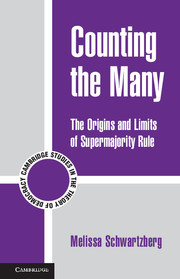Description
Counting the Many
The Origins and Limits of Supermajority Rule
Cambridge Studies in the Theory of Democracy Series
Author: Schwartzberg Melissa
Examines the history underlying the use of supermajority voting rules and offers a critique of their ability to remedy the defects of majority decision making.
Language: English
Subject for Counting the Many:
Approximative price 85.25 €
In Print (Delivery period: 14 days).
Add to cart
Counting the Many
Publication date: 11-2013
Support: Print on demand
Publication date: 11-2013
Support: Print on demand
Approximative price 30.28 €
In Print (Delivery period: 14 days).
Add to cart
Counting the Many
Publication date: 11-2013
248 p. · 13.9x21.5 cm · Paperback
Publication date: 11-2013
248 p. · 13.9x21.5 cm · Paperback
Description
/li>Contents
/li>Biography
/li>
Supermajority rules govern many features of our lives in common: from the selection of textbooks for our children's schools to residential covenants, from the policy choices of state and federal legislatures to constitutional amendments. It is usually assumed that these rules are not only normatively unproblematic but necessary to achieve the goals of institutional stability, consensus, and minority protections. In this book, Melissa Schwartzberg challenges the logic underlying the use of supermajority rule as an alternative to majority decision making. She traces the hidden history of supermajority decision making, which originally emerged as an alternative to unanimous rule, and highlights the tensions in the contemporary use of supermajority rules as an alternative to majority rule. Although supermajority rules ostensibly aim to reduce the purported risks associated with majority decision making, they do so at the cost of introducing new liabilities associated with the biased judgments they generate and secure.
1. Introduction; Part I. A Remedy for the Problems of Unanimity: 2. Prelude: acclamation and aggregation in the ancient world; 3. Unanimitas to a two-thirds vote: medieval origins of supermajority rule; 4. Unanimity and supermajority rule in eighteenth-century France; Part II. A Remedy for the Problems of Majority Rule: 5. Equality, majority rule, and supermajorities; 6. Constitutionalism without supermajorities; 7. Constitutionalism under complex majoritarianism; 8. Conclusion.
Melissa Schwartzberg is an Associate Professor of Politics at New York University. She previously taught at George Washington University and Columbia University. She received her AB from Washington University, St Louis in 1996, and her PhD in 2002 from New York University. She is the author of Democracy and Legal Change (Cambridge, 2007) and of articles in leading journals including the American Political Science Review, the Journal of the History of Ideas, the Journal of Political Philosophy, and Political Theory. She is a 2013 recipient of the Mellon New Directions Fellowship. From 2010 to 2013, she served as the co-president of the Association for Political Theory.
© 2024 LAVOISIER S.A.S.




